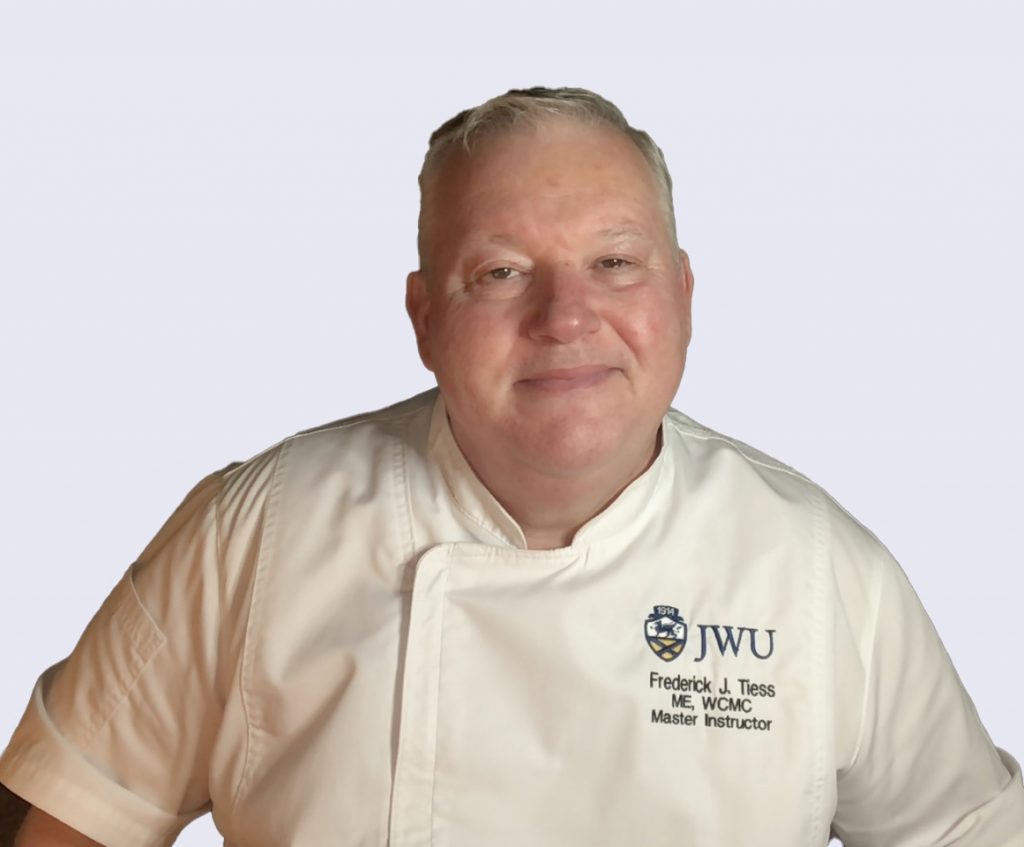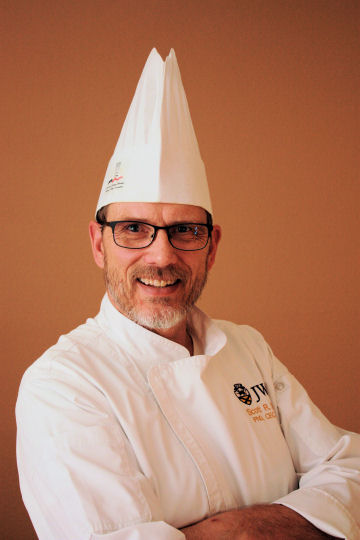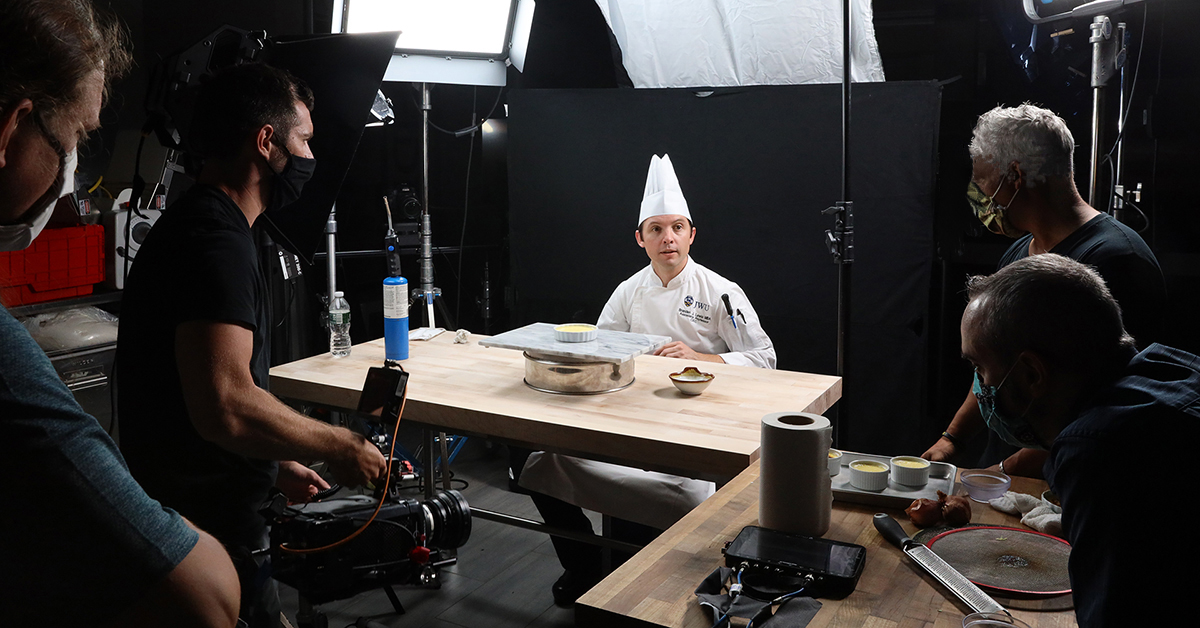With Scott Smith, Director of Online Culinary Programs
Master Instructor Fred Tiess and
Steve Barnes, Senior Instructional Designer/Technologist
Recognized as a global leader in culinary education, JWU is now enrolling for the online Professional Culinary Skills Certificate program. Open in the past only to employees of JWU’s corporate partnerships, Spring 2025 enrollment is open to the public.
A common question prospective students ask us is, “How will I be able to learn culinary skills online?” Master Instructor Fred Tiess and the program’s Instructional Designer Steve Barnes share their thoughts about learning culinary skills in an online environment.
Foundations
How can students learn culinary methods and techniques online and achieve outcomes similar to those in a classroom or lab setting?

Master Instructor Fred Tiess, who teaches full-time on the Charlotte Campus and also in the online PCSK Certificate program, declares, “It’s certainly possible for students to learn if they follow the provided guidance to enhance both their skills and understanding of core principles. A key part of this is learning the importance of planning each step of their work, sourcing ingredients carefully, and organizing their preparations. These foundations — thoughtful preparation, ingredient integrity, and organized execution — are crucial in the journey to becoming a master chef.
Meeting the challenges
What are the unique challenges and solutions associated with teaching hands-on skills in the online environment?

Steve Barnes, Senior Instructional Designer/Technologist at JWU, explains, “One of the biggest challenges with asynchronous online learning is the lack of opportunities for instructors to intervene and provide guidance to students on an ongoing basis.
“On a fundamental level, learning a skill like cooking is different in a self-paced, fully online setting than it is in classroom full of peers and chef instructors. In the classroom, particularly in a hands-on program like culinary arts, there are many moments, planned or not, where faculty can demonstrate a technique, correct a student mistake in real time, or share a new piece of information.
“We aim to replicate these moments in the design of our online courses. Faculty are required to provide feedback for each student assessment within 48 hours of submission, and each assignment has a detailed rubric so they can shape their comments around the different skills students are demonstrating.”
Brooklyn Connell, ’23, commented, “I learned so much from the feedback I received from all the instructors. I would submit videos of myself, so they could observe my culinary techniques and see the food I prepared. Instructors would then record themselves talking about the assignments I submitted.”
Barnes continues, “For instance, if a student is required to submit a video of themselves breaking down a whole chicken into pieces, the rubric for faculty grading can have separate categories for each part. Maybe the student processed the leg sections correctly but left too much meat on the bird around the wings. The instructor can call this out in their feedback, or even record a video response to the student’s submission showing the correct technique.
“Teaching students how to record their demonstrations was also a significant challenge in the development of the program. Many students have never really cooked much before, let alone recorded their cooking to a level of detail where an instructor can assess it.
“To remedy this, our course orientation and several initial assignments are all centered on how to record, edit, and submit technique demonstrations. Detailed instructions and rubrics are also available for every assignment, clearly outlining what things must be demonstrated in order to proceed.”
Sara Osorio, ’23, explained, “I had no prior experience in editing videos. Fortunately, my first course started off with an easy assignment — setting a table. Editing the first video familiarized me with Kaltura, the video software program. I was relieved to find it is easy to use.”
Characterizing herself as someone who is “not great with technology,” Connell agrees that “it’s not too complicated. I think they try to keep the video recording technology simple to help people like me who are technologically challenged.”
Technology and Course Design
How does the integration of educational technology and strategic course design facilitate an effective competency-based curriculum for online culinary programs?
Barnes explains, “Cooking at a professional level requires an understanding and mastery of a wide range of skills that build upon one another in a way that is a perfect fit for a competency-based model of education. This is easy to see in an in-person culinary school classroom; chef-instructors demonstrate skills, students practice them, and then move on to the next skill once they have mastered it, culminating in a composed dish.

Scott Smith, Director of Online Culinary Programs at JWU Online explains, “Each of the online culinary lab courses are developed on the concept of competency-based learning. In each lesson and learning module you will need to successfully demonstrate the completion of a task, skill, or competency before being allowed to move on to the next lesson or learning module. As you progress through each lesson and learning module, there will be assessments, which measure the competencies you have learned in the module.”
Smith continues, “These can be repeated until you have mastered the skill. You will be given the opportunity to attempt a given competency or skill multiple times and receive continuous feedback from the instructor. At the end of the course, there will be a final project & practical which measures your final mastery of the competencies or skills.”
Barnes adds, “In an asynchronous online setting, practicing a skill after watching a demonstration of the skill is a little more challenging. Though students may all start a course at the same time, they are often all at different points in the sequence of content.
“To bridge this gap, our courses are all intentionally designed ‘backwards,’ starting with the core competencies students will gain when they complete the course. From there, we break the content of the course down into discrete modules, each with their own objectives that students must meet in order to proceed.
“For example, if one of the overall goals of a course is to learn how to produce a vegetable soup, we can work backwards from that final product to define what students need to learn along the way — evaluating produce, knife cuts, producing stock, etc. — and order those skill assessments to create a ramp up to the final competency demonstration.
“Along with this general design philosophy, we leverage whatever technology we can to make the experience as close to the classroom as possible,” explains Barnes. “In place of live instructor demonstrations, we have polished, highly produced videos that show students each step of a cooking technique or recipe, along with information about common mistakes.
“Faculty are also encouraged to record their own videos and post them for the class on a frequent basis and are provided with a robust set of feedback tools that they can use when evaluating student work. We also provide students with interactive presentations on each ingredient or new piece of equipment they will use in a given lesson, 360-degree images of JWU kitchens, and printable templates for knife cuts, among many other diverse pieces of content that they can access as they proceed through a given course.”
Rich Clay, ‘23 commented, “My teachers are all highly experienced culinary professionals. They could look at a dish I was preparing and know whether the food was perfectly cooked, or if I had seasoned the dishes well. They also critiqued the visual presentation – what you see on the plate influences how the diner enjoys the meal.”
Example of a video critique for a student from Master Instructor Fred Tiess
Over the course of the PCSK program, you will receive detailed written and video feedback from your instructors from each culinary assignment. The following video clip demonstrates an example of Chef Tiess reviewing a student’s selection and presentation of dishes, while providing feedback and offering tips about what cooking technique would be best to prepare the food.
Master Instructor Tiess concludes, “It’s incredibly rewarding to watch students’ progress throughout the program. As I primarily teach the Capstone Course, students have the opportunity to apply everything they’ve learned while exploring diverse cultures, culinary traditions, and dishes from around the globe. When a student prepares a dish for the very first time — something they’ve never tasted before — and discovers a whole new dimension of flavors, that moment is truly special to observe.”
Clay concurred, “The capstone project in the culinary program was a fantastic opportunity for me to put my passion into practice by creating food fusions from two cultures.”
Difficult to watch himself make mistakes in his early videos, Clay said, “As I improved my techniques during the program, the feedback I received in the videos became one of the things I really liked. The critiques were very thorough; I felt that all my teachers really wanted to help prepare me to succeed in the culinary industry.”
Interested in advancing your culinary career?
Johnson & Wales Online, in collaboration with JWU’s College of Food Innovation & Technology, is now enrolling for the Spring and Summer 2025 online Professional Culinary Skills Certificate program.
A worldwide leader in culinary education, JWU Online prepares graduates to advance their culinary career paths with skills and knowledge of food preparation through this 100% online certificate program. For more information about the PCSK program at Johnson & Wales Online, complete the Request Info form, call 855-JWU-1881, or email [email protected].
